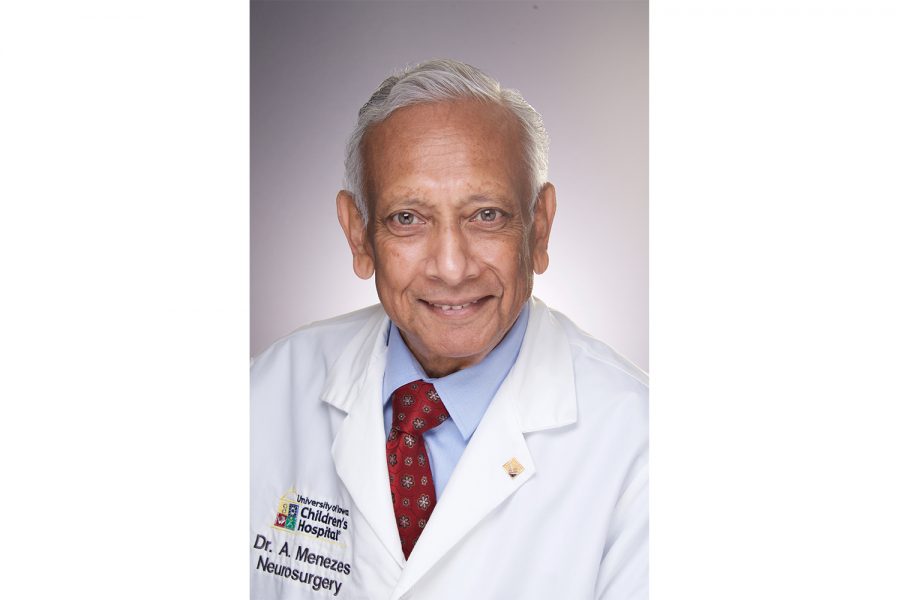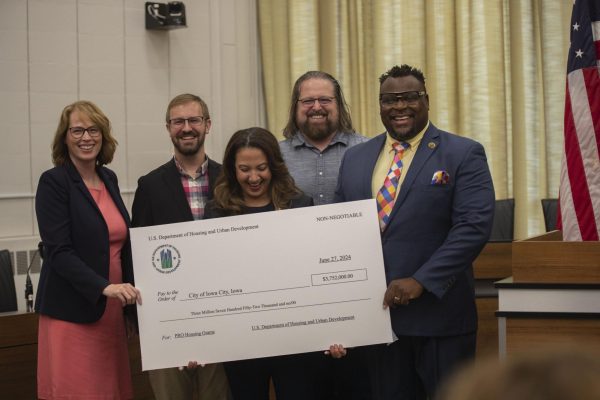University of Iowa pediatric neurosurgeon is 10th recipient of prestigious award
Arnold Menezes, a renowned pediatric neurosurgeon and University of Iowa professor, has received the Franc D. Ingraham Award for Distinguished Service and Achievement. The award is the highest career achievement for a pediatric neurosurgeon and has been given to only 10 people worldwide.
February 3, 2020
Arnold Menezes, a University of Iowa pediatric neurosurgeon and professor, recently became the 10th pediatric neurosurgeon in history to receive the Franc D. Ingraham Award for Distinguished Service and Achievement.
Menezes began at UI Hospitals and Clinics in 1969, as a resident in general surgery and neurosurgery. Once he completed a fellowship in pediatric neurology, Menezes said he was asked to remain at the UI and build up the pediatric neurosurgery and neurosurgical program.
Ever since then, Menezes has redesigned procedures and reduced the risk of mortality for surgeries involving disorders in the craniocervical region.
Menezes said his recent award was initially instituted in 1998 by the American Association of Neurological Surgeons and the Congress of Neurological Surgeons Section of Pediatric Neurological Surgery, in honor of Franc D. Ingraham, a founder of American pediatric neurosurgery.
The award is the highest career achievement in the world for a pediatric neurosurgeon, said UI Professor and Neurosurgery Chair Matthew Howard. World-renowned pediatric neurosurgeons put forward names for consideration and an award-selection committee reviews the academic work of each nominee.
The committee bases its decision on whether the neurosurgeon’s accomplishments are both remarkable and unique, Howard said.
“[Both apply] to Dr. Menezes because his work is so unique and easily differentiated as truly world class,” Howard said.
Menezes is most famous for perfecting operations that address problems where the skull interfaces with the cervical spine, Howard emphasized. Those conditions are both dangerous and difficult to treat surgically, Howard said.
“Before Dr. Menezes entered that field, the complication rates and mortality rates were very high for those operations and very few surgeons tried to do those operations,” he said. “But over a period of 40 years, he systematically developed these very innovative, meticulous, and systematic approaches to surgery, and reduced the complication rate to a very low level.”
Previous challenges in this type of surgery involved accessing the interfacing area, Menezes said. There was no answer to the issue in neurosurgical literature anywhere in the world, so Menezes began a research endeavor with other pediatric neurosurgeons.
“My research endeavor was mainly at the junction of the skull base between the skull and the cervical spine because the mortality was very high, like 30 percent, if patients were operated from behind when the problem was in front,” Menezes said. “We designed the diagnostic procedures as well as the different operative approaches and surgical techniques. This started the evolution of the database for problems with the cranial-cervical junction.”
That same database now involves more than 7,000 patients that come from around the world, he added.
Menezes has inspired many of the neurosurgery trainees within UIHC to pursue pediatric careers, Howard said. Due to his mentorship over the last 20 years, the hospital has produced the third highest number of people going into academic pediatric neurosurgery in North America, he said.
“He has been an incredible mentor to me,” UI Neurosurgery Assistant Professor Brian Dlouhy said. “As a resident and younger faculty member, I’ve learned a tremendous amount from him.”
Dlouhy emphasized that Menezes is very encouraging of residents interested in going into pediatric neurosurgery and engages with them while still seeing and treating patients.
“[I feel like] a parent; they are all my kids,” Menezes said. “I’m very proud of all their achievements because each one of them has gone ahead and furthered the cause — not just what I do, what I did, or what I taught them, but in their own way.”














